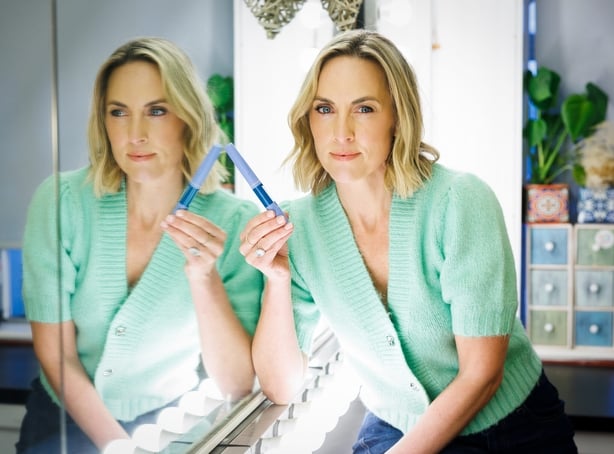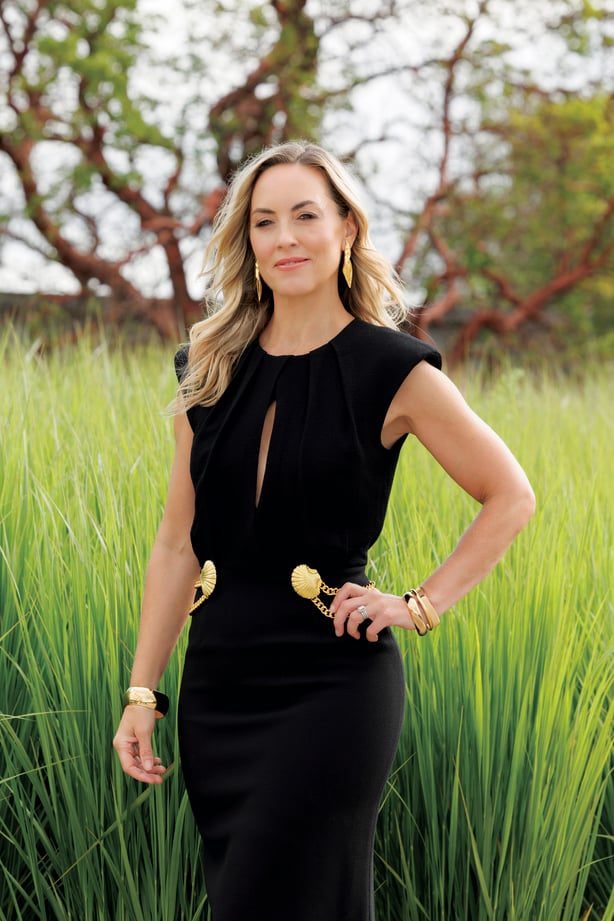Kathryn Thomas says she first realised that something was different about the popularity of GLP-1 medications like Ozempic and Mounjaro last year. A friend of hers, who is a doctor in the Middle East, highlighted a stark change she was seeing in communities around her.
"She said to me, Jesus, Kathryn, the entire Middle East is shrinking. She was like, 'these drugs are available and you don't need a prescription. You just go into your pharmacy. Literally the Middle East is shrinking and you can see it visibly every month'. And I just went, holy s**t. It's big."
The presenter's latest project, The Skinny Jab Revolution, is a deep dive into GLP-1 medications, like Ozempic, Wegovy and Mounjaro, that are being used to assist weight loss, despite initially coming about as a treatment for diabetes. The documentary explores their huge impact - both positive and negative.

Speaking on the phone before the show airs, Thomas explained that she wanted "to understand more and to educate myself more and to look at the medication from both sides".
"I think the fact that it happened so quickly", she says, articulating what I imagine is many people's reaction to the sudden prevalence of GLP-1 weight loss medications in recent months. "It's the biggest breakthrough in medicine for I don't know how long. And it's like the world wasn't ready for it. It's like the pharmaceutical companies weren't ready for it."
From endless TikTok videos of charting the effects of the drugs, to celebrities like Oprah Winfrey and Robbie Williams being outspoken and forthcoming about using the medications, words like 'Ozempic' and 'Wegovy' have become as common as 'Botox', but in a fraction of the time.
Watching, like all of us, as these drugs became household names, Thomas had a thought: "What does that mean for the messaging of good health? And what does that mean for me as a mum and my children?
"I have a seven-year-old and a three-year-old. What is the message that that is sending out when I have been banging the drum about health and I've been banging the drum about the importance of exercise, not just for your physical health, but for your mental health, not just to maintain a healthy weight, but to try and live a long life."
"I remember literally bawling my eyes out."
— RTÉ One (@RTEOne) March 3, 2025
Olwyn was told she would not be able to foster or adopt a child because of her BMI. After four IVF attempts, she decided to try GLP-1 weight loss medications.#SkinnyJab | Monday at 9.35pm pic.twitter.com/C7nceZ8fKf
Coming from a long track record of presenting Operation Transformation, it's a conversation Thomas has been involved in for years. The show was, she acknowledges, very "weight-focused" in its early years. By the end, she says, "We were never looking at weight on an individual basis. We were looking at weight as part of an overall barometer for good health."
Thomas says she approached this documentary with the same mindset, looking at prevention and trying to weigh up all sides of the divide.
Over the course of the two-part documentary, Thomas meets with experts, doctors and people living with obesity and other conditions who have achieved truly life-changing results with the medications. She says she's seen up close how they can transform not only a person's health and wellbeing, but their confidence.
Scientific understanding of obesity has changed in recent years, with the World Health Organisation recognising it as a complex disease that can lead to numerous chronic conditions and complaints.
"We understand now that obesity can be genetic, it can be biological, it can be environmental, it can be psychological", Thomas says. "You have to treat obesity and treat somebody who is coming looking for help with an overall multifactorial approach."
"Now the science tells us we know that people can lose weight, but it is very difficult to keep it off. And so if you have a drug like this that comes along and works in conjunction with psychological support, with nutrition support, with physical exercise support, then that is a match made in heaven in terms of being able to give somebody the tools.

"Somebody who's living with obesity might not be able to exercise, but they might not even have the confidence, but they might not physically be able to do it. So a drug like this in conjunction then will get them and help them get to a place of new confidence, new acceptance.
"It's a great tool for people who need it. It's a great tool when managed and prescribed by the experts who know how to use it", she says. But there is a stark divide between those using the medication because they truly need it, and those using it just to alter their appearance, and doing so without professional guidance, she adds.
"When you've got somebody in the upper side of Manhattan who is not living with obesity, but is willing to shell out 1,500 quid so they can be even skinnier than they are, versus people in West Virginia who are living with obesity, who have no access for miles to fresh food, to wholefoods. They live in areas called food deserts, where 100 per cent of their diet is ultra-process food", Thomas says, referencing two separate people she met while filming.
"I didn't think I would probably have been such a supporter of these drugs before I really started looking at it last year. And I do see their huge benefits. But I say that with a red card up as well, [that] in the wrong hands, like anything, like any medication, it can be detrimental", she says.
Of course, when talking about weight loss and health, no two cases are the same, and you can't apply one approach that worked for one person to everyone else. Factors such as genetics, what kind of work you do, health conditions, life stages such as menopause, and many more come into play when it comes to how our bodies process and hold onto fat. There is no one size fits all.
As for where she falls on the divide, Thomas doesn't have an answer: "I thought I'd have an answer by the end of this, but I actually don't. It's taught me a lot. Do I know where I land? No, I can see I land on both sides. I see pros and I see cons. It's going to change society for the better and the worse."
Thomas is also keenly aware that such a documentary is going to ignite debate online, and when asked if she's expecting such a reaction, her answer was clear: "I have been accused of so much, and I suppose this is it. All I will ever do, and the only work I will ever take on is something that I'm very passionate about and something that I believe in.
"I knew that this was going to be divisive. I knew it was going to be very nuanced. As I said, I'm in taboo territory. But I feel that this message, and to educate people in this space no more than I had to educate myself, it's critical that we do it."
Watch The Skinny Jab Revolution on Monday 3rd March, 9.35pm on RTÉ One.

